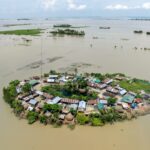
Responding to Climate-Induced Transnational Migration: An Action Plan
A new WRMC Action Plan outlines three workable, politically saleable and rights-regarding actions that states and other actors can employ to address climate-induced migration.
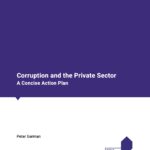
Corruption and the Private Sector: A Concise Action Plan
Peter German Canadian Task Force Against Global Construction Download the Action Plan: The pace of life, and crime, have accelerated exponentially in recent years. As
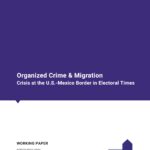
Organized Crime & Migration: Crisis at the U.S.-Mexico Border in Electoral Times
A Working Paper from the North and Central American Task Force on Migration In this report, we wish to highlight the importance of increasing public

Avoiding Direct Confiscation: A Bond-lien Guarantee Mechanism to Help Ukraine
Instead of confiscating Russian assets, Western governments can use them as security for loans of equal value immediately to support Ukraine.

Social Bonds: A New Variant of ‘Lend-Lease’ to Rebuild Ukraine
New Policy Brief outlines the creation of a mechanism to issue ‘Social Bonds’ for Ukraine’s reconstruction to mobilize the vast resources of the private sector for Ukraine’s reconstruction in the near term.

Canadian Ukrainian Social Impact Reconstruction Trust Fund
Alison Lawton & Lauren Casey Discussion paper produced as part of the World Refugee & Migration Council’s Canadian Task Force Against Global Corruption. Abstract According

Leading by Example
This paper by Robert Currie, Fen Hampson and Allan Rock examines the precedent-setting nature of Canada’s new legislation on foreign-owned asset forfeiture and some of the legal issues raised following the adoption of this new legislation. It also discusses policy and legislative initiatives underway in other countries following upon Canada’s ground-breaking legislation and how the current global context is shaping these initiatives, specifically Russia’s invasion of Ukraine.

Toward a More Effective Implementation of Anti-Corruption Measures
New discussion paper from Sabine Nölke outlines specific ways to more effectively implement anti-corruption measures by strengthening existing frameworks and institutions.

Multilateral Action Model on Reparations
Developing an Effective System for Reparations and Compensation for Ukraine and Ukrainians for Damage Caused by the Russian Federation

A Renewed Call to Action: Responding to Refugees and Forced Displacement
The World Refugee & Migration Council’s new report on the global response to forced displacement finds political will in short supply, with dangerous backsliding by governments, increasing xenophobia and buck-passing of responsibility.

Frozen Russian Assets and the Reconstruction of Ukraine: Legal Options
This research paper assesses the four main legal options in dealing with frozen Russian assets: continued freezing, confiscation, private claims, and enforcement of a foreign judgement or international award.

Task Force Summary Report: Key Recommendations
The North and Central American Task Force on Migration has launched its report with key recommendations for improving regional cooperation and responsibility sharing.
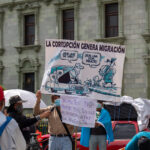
Institutional and Political Drivers of Migration in Central America
When Central American migrants are asked why they decided to leave their countries, they give a variety of responses; they’re seeking better economic opportunities, family reunification, protection from extortion and criminal violence, hope for a better future for their children. Often it is a combination of factors that drive migration, and the drivers of migration are themselves linked.

Economic and Environmental Drivers of Central American Migration
Most Central American migrants cite economic conditions as a reason for their decision to leave their countries. For some it is the only reason: they migrate because they can no longer survive where they are. For some, their loss of livelihoods is due to environmental pressures such as drought, hurricanes or the long-term effects of climate change. For others, their decisions to migrate are the result of both economic desperation and personal insecurity due to criminal violence. For almost all of them, poverty and loss of hope that conditions will improve are factors in their decisions to move.
Alternative Protection Pathways in the Americas
Research Paper — Jennifer Bond North and Central American Task Force on Migration Author Jennifer Bond
Strengthening Regional Cooperation on Migration from Central America: Possible Ways Forward
Research Paper — Ariel G. Ruiz Soto North and Central American Task Force on Migration Author Ariel G. Ruiz Soto
Pathways for Labor Migration from Northern Central America: Five Difficult but Necessary Proposals
Research Paper — Michael A. Clemens Very few labor-based pathways for regular migration are available for people in Northern Central America (NCA), often called the
Environmental Drivers of Migration from Northern Central America
Research Paper — Pablo Escribano North and Central American Task Force on Migration (Available in English only) Author Pablo Escribano
Criminal Governance in Northern Central America
Research Paper — Pamela Ruiz North and Central American Task Force on Migration Author Pamela Ruiz
La pobreza como causa esencial de la expulsión humana y la migración (Centroamérica 2021-2022)
Documento de investigación — Jaime Ordóñez Author Jaime Ordóñez
Organizaciones regionales y migración en Centroamérica
Documento de investigación — María Eugenia Anguiano Téllez Author María Eugenia Anguiano Téllez
Estado de Derecho en Centroamérica: consideraciones económicas y fiscales de la migración forzada
Documento de investigación — Carlos Alvarado Author Carlos Alvarado

Migrant Remittances to Central America and Options for Development
Research Paper — Manuel Orozco North and Central American Task Force on Migration Introduction Remittances are the most visible economic activity among migrants that makes
Integración desigual en México: Brechas y retos para la integración de inmigrantes centroamericanos en los inicios del siglo XXI
Documento de investigación Grupo de Trabajo de Centro y Norteamérica sobre Migración Andrea Bautista León María Adela Angoa Pérez Silvia Elena Giorguli Saucedo Author Andrea
Reintegración y retorno forzado en el norte de Centro América
Documento de investigación — Organización Internacional para las Migraciones Grupo de Trabajo de Centro y Norteamérica sobre Migración Author Organización Internacional para las Migraciones

Power & The Margins: The State of Refugee Participation
Published by the Global Refugee-Led Network and written by Global Independent Refugee Women Leaders (GIRWL) Co-founders Shaza Alrihawi, Anila Noor and Najeeba Wazefadost, with John
Narratives of Migration and Integration of Central American Migrants in the US and Canada
Research Paper – Leisy J. Abrego North and Central American Task Force on Migration Author Leisy J. Abrego

Event Report: Displacement in Afghanistan—How Should the International Community Respond
Watch the event recording On September 14, 2021 the World Refugee & Migration Council in collaboration with the US Institute of Peace and the University
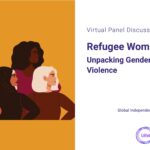
Refugee Women: Unpacking Gender-Based Violence — Event Report
Bárbara Romero, Co-founder, Global Independent Refugee Women Leaders (GIRWL) Translated Versions: Arabic Farsi Spanish The conference Refugee Women: Unpacking Gender-based Violence 2020 opened an online space —

Reducing Irregular Migration from Central America Through Alternative Regular Migration Pathways
The short answer to the question of why so many Central Americans are setting off on dangerous irregular migration journeys is stunningly simple: because there is virtually no way that they can move through regular, legal, safe channels.
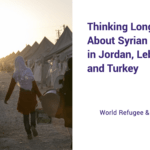
Thinking long-term about Syrian Refugees in Jordan, Lebanon and Turkey
Watch the full event and read about the panelists on our Thinking Long-term About Syrian Refugees in Jordan, Lebanon and Turkey event page. On September 9,

Event Report: Pathways for Protection
Watch the full event and read about the panelists on our Pathways for Protection: Sponsorship Initiatives for Refugees event page. More than 20 million people in
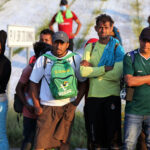
Cooperación y corresponsabilidad regionales
El fortalecimiento de los mecanismos regionales de corresponsabilidad en Centroamérica para las personas migrantes y refugiadas no solo ofrece una nueva perspectiva para responder a la migración en la región, sino que también contribuirá a mejorar la distribución de responsabilidades a nivel mundial, tal como lo piden el Pacto Mundial sobre Refugiados y el Pacto Mundial para una Migración Segura, Ordenada y Regular.

Regional Cooperation and Co-Responsibility
This report from the North and Central American Task Force on Migration outlines concrete recommendations for a comprehensive regional approach and governance architecture to address migration. The issues are simply too complex to be dealt with by any one country acting along.

The Risks of ‘In-Country’ Processing: An Assessment of the US Central American Minors Program
WRMC Research Paper Claire Higgins & Molly Fee Faced with an increased number of asylum seekers at the US-Mexico border, the Biden administration has reopened
The Economic Impact of the Syrian Refugee Crisis in Lebanon: What It Means for Current Policies
This study focuses on the impact of the refugee crisis and policies on Lebanon’s economic situation and propose alternative solutions that could support refugees and hosts amid the collapse of the economy, following decades of mismanagement and corruption of the Lebanese political system.
Improving Syrian Refugee Inclusion in the Turkish Economy: How Can the International Community Help?
This report advocates to improve the prospects of access to sustainable livelihood for refugees by emphasizing the role of the international community to help to create demand for refugee labor in Turkey in a manner that benefits the host community as well.
Moving beyond Humanitarian Assistance: Supporting Jordan as a Refugee-hosting Country
This study, conducted by three economists in the region — Belal Fallah, Rasha Istaiteyeh and Yusuf Mansur — analyzes the impact of Syrian refugees on Jordan’s economy and suggests ways that the international community can receive more international support. The issue of global responsibility-sharing for refugees was a major theme of the World Refugee Council’s (WRC) A Call to Action report in 2019.
Thinking Long-term about Syrian Refugees in Jordan, Lebanon and Turkey
This summary repor the WRMC commissioned research in Jordan, Lebanon and Turkey to assess alternative solutions for Syrian refugees in the medium to long-term and the three governments hosting the largest numbers of Syrian refugees. The central research questions for the study were:

Reporte interino y recomendaciones — Protección humanitaria en la región: un estado de emergencia
Este reporte del Grupo de Trabajo de Centro y Norteamérica sobre Migración destaca la urgencia de respuestas regionales integrales que aborden las necesidades de protección humanitaria de migrantes y refugiados en la región.

Humanitarian Protection in the Region: A State of Emergency
This report from the North and Central American Task Force on Migration highlights the urgency for comprehensive and coordinated regional responses to address the humanitarian protection needs in Central America and Mexico. It outlines recommendations for concrete actions that can be taken immediately, even as efforts continue in the region to address the deeper and systemic causes of migration.

Emerging Market Finance Refugee Crisis Application: Rationale and Roadmap
Special Report by Gary N. Kleiman In 2019 the World Refugee & Migration Council issued “A Call to Action” recognizing the need for private sector

Event Report: Climate Change & Forced Displacement
Watch the full event and read about the panelists on our Climate Change & Forced Displacement event page. As part of the World Refugee &

Event Report: Vaccine Equity for the Forcibly Displaced
Read the report from the WRMC’s Vaccine Equity for the Forcible Displaced event featuring HRH Prince El Hassan Bin Talal, the Hon. Lloyd Axworthy and COVID-19 pandemic experts moderated by Rosemary McCarney.

Event Report: Building Political Will in the Americas
Read the report of our panel discussion with three leaders — Madeleine Albright in the United States, Lloyd Axworthy in Canada and Mayu Brizuela de Ávila in El Salvador — on the domestic and regional actions and policies as well as the international peace and security diplomacy needed to build political will and transform governance to reset the response to forced displacement. New York Times columnist Nicholas Kristof moderated the event co-hosted by the Aspen Ministers Forum.
Corporate Citizenship & Refugee Inclusion: Harnessing Global Private Regulation and Corporate Social Responsibility
Lawrence L. Herman A Call to Action: Transforming the Global Refugee System, the comprehensive report issued by the World Refugee & Migration Council (WRMC) in

Event report: Refugees, Education and Conflict
On January 27, 2021 the World Refugee & Migration Council (WRMC) hosted an event with the US Institute of Peace (USIP) to explore linkages between
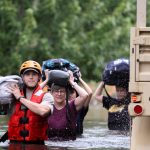
Forced displacement and climate change: Time for global governance
The World Refugee & Migration Council’s Rosemary McCarney and Jonathan Kent make the case for global governance of forced displacement caused by climate change.

Event Report: Challenges Facing Syrian Refugees and Jordan
Discussion: Pressures from a pandemic The panel discussion was moderated by Elizabeth Ferris, WRMC Vice President of Research, with introductory and closing remarks provided by

Challenges Facing Syrian Refugees and Jordan: Pressures From a Pandemic — Summary Report
The triple pressures presently facing Jordan are considerable: the public health emergency due to COVID-19; the economic effects of containment measures and the global recession; and the growing number of Syrian refugees, many of whom have been in the country for almost 10 years.
Between Two Outbreaks: Syrian Refugees and the Consequences of COVID-19 in Syria and Jordan
It has been a decade of conflict, destruction and suffering for Syrians both inside Syria and beyond its borders. The Syrian conflict has resulted in one of the most catastrophic humanitarian crises in recent memory.
Impact of COVID-19 on Syrian Refugees in Jordan from the Refugee Perspective
The main concerns for Syrian refugees since their arrival in Jordan, according to this study’s findings, have been safety, family unity, finding ways to sustain themselves and their families, and ensuring a better future for their children.
The Economic Impact of COVID-19 on Syrian Refugees in Jordan
The impact of “Coronomics” could signify the largest reversal in human development on record. The novel coronavirus (COVID-19) pandemic has had devastating influence on the world’s most vulnerable population — refugees and displaced persons.

Crisis in Lebanon — Event Report
On August 4, 2020 a large amount of ammonium nitrate exploded in the port of Beirut, Lebanon. The blast injured more than 6,500 individuals and

COVID-19 and the Displaced
This literature review examines how the COVID-19 pandemic impacts the displaced population, both from a health perspective and the wider socio-economic aspect.

Holding Kleptocrats to Account — Event Report
This event report summarizes our August 2020 conversation with champions of innovative solutions to combat grand corruption and assist those who have been forcibly displaced as a result.

Repurposing Frozen Assets to Assist the Forcibly Displaced — Research Paper
Legal analysis of innovative options for repurposing frozen assets of kleptocrats to assist the forcibly displaced and the countries hosting them.

Virtual Conference Report — Refugee Women: Responding to COVID-19
Read the final report from our virtual conference with the Global Independent Refugee Women Leaders (GIRWL) network on June 9, 2020. Author WRMC
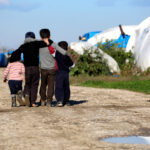
Meaningfully Engaging Youth in the Governance of the Global Refugee System — Research Paper No. 18
This paper aims to demonstrate the importance of including displaced youth in governance and decision making, to identify key barriers to engagement that displaced youth face, and to highlight effective strategies for engaging youth.
The Role of Technology in Addressing the Global Migration Crisis — Conference Report
One of the first of its kind, this multi-stakeholder event brought together representatives from the private sector and civil society as well as researchers and former political leaders to explore the challenges and opportunities in the use of technology and its potential to transform the global refugee system.
Making States Accountable for Deliberate Forced Displacement — Research Paper No. 17
While the international refugee regime is anchored in the 1951 Refugee Convention and the work of the United Nations High Commissioner for Refugees (UNHCR), the Convention is silent on the question of state culpability, and the UNHCR’s Statute established its entirely non-political character.
The Global Refugee Regime and UN System-wide Reforms — Research Paper No. 16
This paper considers how responsibility for ensuring refugee protection and access to solutions can be shared more reliably across the United Nations’ system, by examining entry points beyond traditional humanitarian actors (including peace and security actors in the United Nations), as well as the role states can play in supporting a broader response from the UN system.
Digital Developments: Harbingers of Humanitarian Change? — Research Paper No. 15
The author analyzes three digital trends with the potential to create profound changes, perhaps even to redraw the boundaries of what constitutes “protection,” a notion upon which the humanitarian system is based.
Innovations in Responsibility Sharing for Refugees — Research Paper No. 14
This paper calls for a clearer understanding of the meaning and application of responsibility sharing for the protection of refugees and for further examination as to how the refugee regime interacts with other areas of international governance.
Governance of the Global Refugee Regime — Research Paper No. 13
The authors propose a model for enhanced governance of the regime that could contribute to improved protection and solutions for refugees and to more predictability for states and the international system.
Data Protection and Digital Agency for Refugees — Research Paper No. 12
This paper analyzes how the vast amount of data collected from refugees is gathered, stored and shared today, and considers the additional risks this collection process poses to an already vulnerable population navigating a perilous information-decision gap.
Opportunities and Challenges of Emerging Technologies for the Refugee System — Research Paper No. 11
Efforts are being made to use information and communications technologies to improve accountability in providing refugee aid. However, there remains a pressing need for increased accountability and transparency when designing and deploying humanitarian technologies.
Innovative Global Governance for Internally Displaced Persons — Research Paper No. 10
While the humanitarian response in emergency situations is more effective than a decade ago, overall governance — the set of norms, institutions and processes necessary to address internal displacement — remains weak.
Resolving Refugee Situations: Seeking Solutions Worthy of the Name — Research Paper No. 9
This paper reviews recent developments, ideas and opportunities associated with the search for durable solutions to the displacement of refugees and other forced migrants, in particular, internally displaced persons.
Refugee Voices — Research Paper No. 8
Numerous refugees themselves believe that having their voices heard is an indispensable basic need, but although refugee voices are often given lip service, they are rarely taken seriously.
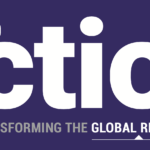
The Essentials — A Call to Action: Transforming the Global Refugee System
This summary document, The Essentials, introduces the bold actions by theme proposed in the Council’s A Call to Action report.

A Call to Action: Transforming the Global Refugee System
Nearly 70 million people around the world, half of them children, fled persecution and conflict, sought asylum or were internally displaced in 2017, and those
“Call Me a Business Owner, Not a Refugee!” Challenges of and Perspectives on Newcomer Entrepreneurship — Research Paper No. 7
Lubna Rashid Participating in the labour market is vital to newcomers’ successful integration in the host country. Although most newcomers participate through wage earning, some
Harnessing Trade Law to Support Refugees and Host Countries — Discussion Paper No. 3
Lawrence L. Herman The World Trade Organization estimates that more than 65 million people globally are refugees or displaced persons. Beyond the human dimensions of
Using the Compact Model to Support Host States and Refugee Self-reliance — Research Paper No. 6
Nazanin Ash and Cindy Huang Traditional financing mechanisms for the global refugee system do not reflect the realities on the ground. The life-saving assistance prioritized
No Strangers at the Gate: Collective Responsibility and a Region’s Response to the Venezuelan Refugee and Migration Crisis
Este informe también está disponible en español Michael J. Camilleri and Fen Osler Hampson Venezuela’s political, economic, and humanitarian crisis has given rise to the
Xenophobia toward Refugees and Other Forced Migrants — Research Paper No. 5
Sarah Deardorff Miller Generally speaking, those who study forced migration and those who advocate for solutions to forced migration generally spend little time studying xenophobia.
Assessing the Impacts of Hosting Refugees — Research Paper No. 4
This paper reviews the existing research examining the impacts of refugee hosting through economic, social, political, environmental and security perspectives, identifying areas of consensus and
From Rhetoric to Reality: Achieving Gender Equality for Refugee Women and Girls — Research Paper No. 3
Eileen Pittaway and Linda Bartolomei This paper addresses the international refugee regime’s failure, despite significant international law and policy developed over the past 30 years,
Refugees and the City: The Twenty-first-century Front Line — Research Paper No. 2
Robert Muggah, Adriana Erthal Abdenur Today, more than 60 percent of all refugees and 80 percent of all internally displaced persons are living in urban
Mobilizing Political Will for Refugee Protection and Solutions: A Framework for Analysis and Action — Research Paper No. 1
Many commentators have suggested that the displacement of people across international borders is caused by a lack of “political will,” and that refugee situations could be averted, mitigated or resolved if only such will existed. However, there has been little serious analysis as to what “political will” means and how to generate and sustain it in a refugee context.
Keeping the Promise: Three Proposed Accountability Mechanisms for the Global Refugee Regime — Discussion Paper No. 1
Accountability is lacking at every point in the refugee cycle — from upstream, where refugee flows are triggered violently and with impunity by criminal regimes
Transforming the Global Refugee System: Solidarity, Humanity and Accountability — Interim Report
The World Refugee Council was created to build on the momentum generated by UN meetings in New York in September 2016, which saw the unanimous
World Refugee & Migration Council Research
The bold recommendations of the World Refugee & Migration Council’s (formerly called the World Refugee Council) Call to Action: Transforming the Global Refugee System report are grounded in peer-reviewed research papers and reports on issues impacting displaced people and migrants.
New research to support the Council’s projects for implementing many of its innovative proposed actions focuses on:
- Holding governments and kleptocrats accountable for displacement
- Gender — with a particular focus on refugee women and girls
- Climate change and migration, and
- Host communities — both the impact of protracted displacement and innovative ways of supporting host governments
The research agenda will continue to evolve as the Council engages in other issues, such as the impact of COVID-19 on Syrian refugees. Researchers interested in submitting their work for possible publication are encourage to contact us at: research@wrmcouncil.org
Latest Updates
- CBC Montreal: Running Marathons Helps Group of Refugees Adjust to Life in Canada
- World Refugee & Migration Council Urges Actions to Counter Breakdown of the International Refugee System
- Webinar — Responding to Climate-Induced Transnational Migration: An Action Plan
- Why Corruption is a Driver of Displacement
- Keeping Business Clean: Combatting Corruption in a World of Change